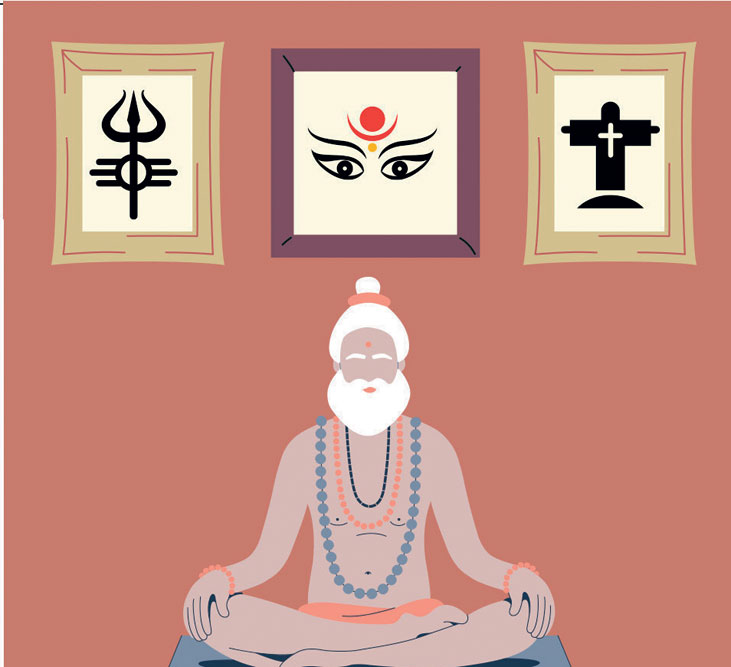Columns | Byline
Flying in the Age of Insecurity
Are we tempting the lords of nationalisation to dangle another threat?
 MJ Akbar
MJ Akbar
 MJ Akbar
27 Sep, 2024
MJ Akbar
27 Sep, 2024
/wp-content/uploads/2024/09/Fearforflying1.jpg)
(Illustrations: Saurabh Singh)
IT IS SUCH A PITY that Vistara is going to fold up just when they found the perfect napkin. On a recent flight from Delhi to Bengaluru the serviette was paper-thin, viscous, disposable, rather than the heavy cotton offered earlier, more suited to the Victorian travel framework than the lithe, short-haul spirit of modern flights. The one asset it could not transfer from the old version was the eye in the corner which helped you attach the napkin to your shirt button, a very practical requirement of colonial antecedence if you wanted shirts without stains. For the airline the change must mean loads of savings in washing bills, so no Diwali gifts for Vistara management this year from the laundry contractor.
As Vistara fades into Air India, an inevitable question: Will the bad destroy the good after the merger as it generally tends to do? Will Vistara’s excellent crew service sink to the current Air India’s pathetic levels?
Air India, started by JRD Tata, was nationalised in 1953, and left in competent hands until the government decided that the omnipotent bureaucrats in its service were as good at running an international airline as shuffling a file from the ministry of health to the ministry of welfare. The Tata family bought it back in January 2022 after this quality airline had been destroyed by political control but have not been able to salvage its reputation over nearly three years of effort. Many of their flights, let’s face it, stink. Literally. The service has a different toxicity. It smells of a sense of entitlement, as if the staff are doing you a favour. Maybe they are all secret Marxists and resent your presence particularly if you are in business class. One passenger on a recent visit to Singapore repented bitterly after the callous indifference of the crew. At least she kept her complaint private, although no one in our circle is going to fly Air India anytime soon. Newspapers carried a story, after it had gone viral on social media, of a first-class passenger who described the rubbish he was offered in lieu of food, the insolence that accompanied the victuals, and broken seats. Air India repaid the `5 lakh-plus he had spent on the ticket. Did they take any action against the crew? Let me suggest an answer without checking. No.
Vistara was not complaint-free. Nothing is. But the service is generally immaculate, the crew friendly and motivated despite the terrible hours. (Don’t confuse flying with glamour; it is the most difficult of professions.) Vistara’s on-time record is almost as good as Indigo’s, which is the leader by far in the basic experience of getting you from Point A to Point B with the minimum of hassle. Rahul Bhatia, who owns Indigo, knows how to run an airline. He is also terribly lucky. He does not live in an age when commercial success generated envy in the political class. He is beyond the cold clutch of nationalisation. Air India made the mistake of succeeding at a time when governments were pompous enough to believe that they were the only guardians of the public good. They are guardians but not the only ones. The damage done by their excess has caused a much-needed deflation in the pomp and circumstance of the political class.
Occasional doses of deflation may now be essential in the private sector. Very recent experience indicates serious indifference to security generated possibly through berserk computers, but that is not an alibi when it comes to a security breach. In a specific case, Vistara claimed that a particular passenger had been on a flight she had definitely not taken. An email pointing this out brought the timeless response of a stonewall establishment: hi hi ha ha hope you are in excellent but no, we never make mistakes. When facts were reaffirmed in a subsequent email: silence. Silence on the real question; which is security. Who had travelled on that seat in the name of this passenger? If the Vistara computer had recorded the journey, someone had. I tried to ask. Lots more of silence.
Maybe the gods of air travel knew this was going to be a subject of this column. Knowledge is the privilege of divinity. At 12:58 on September 25, I got a computer-generated message on my mobile from CP-AKASAA, very cheery: “Hi m j, your flight QP 1628 to GOX will be boarding from Gate 02. The boarding gate will close 25 mins prior to departure. We look forward to welcoming you on board and enjoy the Akasa experience”.
At 17:05 came a second message: “Hi m j, your checked-in baggage for Akasa Air flight QP 1628 will arrive on Belt No. 02. Thank you for flying with us and look forward to seeing you again.”
First. Dear Akasa Computer, Will you please stop calling me ‘m j’ even if you do so in lower case and keep an unnecessary gap between the initials? That nomenclature is for friends and it is difficult to make friends with an aeroplane. And while in the process of reform, if you can use full words of greater length without exhausting your framework strength maybe you could use ‘minutes’ instead ‘mins’. Passengers would be grateful for clarity. Be that as it may, to turn to the crux of the matter.
I was not on that flight from Bengaluru to Goa. That booking had long been cancelled as my schedule had changed and one had to return to Delhi from Bengaluru. Let us assume that the computer did not register the cancellation, for whatever reason. Perhaps the booking company did not follow through; perhaps. But that is not the point. How does a passenger with my name reach Goa on this flight, with baggage? Who was sitting in that seat? If there was a second person with my name that second person would have a different mobile number. What happened to the multiple checks in the process? How does a passenger get through a full flight under a false name? Isn’t that worth an enquiry, Messrs Vistara and Akasa?
Or are you tempting the lords of nationalisation to dangle another threat, this time in the legitimate pursuit of safety in our age of insecurity?
INCLUSIVE INDIA AT RISHIKESH

My Bengaluru event was a book launch. Romanian Ambassador Daniela-Mariana Sezonov Tane’s Twilight Chronicles is a journey through mystic India in search of herself, made when she was younger. Others have been on this journey, but few with her writing skills. An old yogi she met on the left bank of the Ganga in Rishikesh, living in a single-room mud hut, without any airs or graces, whose name is not mentioned because it did not matter, who lived on fruits and vegetables he grew on his patch and would perhaps have laughed if told he should get on a motorcycle and pose for the cover of national magazines, his skinny frame dressed only in ascetic saffron, the walls of his kutia adorned not only with images of Lord Shiva and Goddess Durga but also Jesus, taught her the principle of India’s deep, abiding belief in tolerance rooted in the civilisational space of ancient Hindu philosophy: “God is the same, whatever we may call him, and we have a duty to respect him regardless of the name he bears when he appears. Buddha, Mahavir, Jesus, Mohammed, Visnu and Shiva are all avatars of the same unique force, embodied precisely to save humankind and lead it towards the ultimate liberation.”
This is the India of the sacred Ganga. That is the philosophy too many of us need to recall, for that is the truth of our motherland.
FAMOUS FIRST WORDS

Famous last words are always fun to read, not least because the dead are not around to refute the quotation. Did Oscar Wilde actually say, “My wallpaper and I are fighting a duel to the death. One or the other of us has to go”? Who cares: the quote is in character and the wallpaper won. More intriguing were Albert Einstein’s first words. He did not speak till he was two, when he was shown his newborn sister and told he could play with her. Einstein’s first words were: “But where are its wheels?”
True or not, this too is in character.
About The Author
MJ Akbar is the author of, among several titles, Tinderbox: The Past and Future of Pakistan. His latest book is Gandhi: A Life in Three Campaigns
More Columns
Beware the Digital Arrest Madhavankutty Pillai
The Music of Our Lives Kaveree Bamzai
Love and Longing Nandini Nair